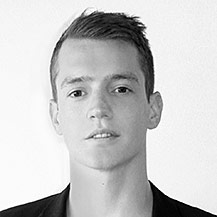Philosophy as a Tool to Improve Habilitation
PhD student Kristian Martiny helps the Helene Elsass Center, a research and therapy centre, improve the lives of children, adolescents and adults with cerebral palsy (CP) by developing new strategies, technologies and interventions for habilitation. His starting point is in the interdisciplinary research field embodied cognition, which encompasses philosophy, neuroscience, psychology and anthropology. Philosophy’s contribution consists of language, ideas and terminology that build bridges between the disciplines and, in doing so, between the brain, mind and body.

Kristian Martiny
Kristian Martiny conducts studies of how people with CP experience their capabilities and limitations, and how they experience their own bodies, both individually and socially. He focuses on three parameters - brain, body and social relations - in order to seek a broader understanding of how people think. Key to this work is the development of therapy that prioritises how the individual experiences his or her possibilities, rather than the differences between people with CP and those without.
Innovation and impact
The research project’s innovative contribution includes new strategies and technologies for habilitation, and consequently new forms of treatment in practice. Technological and social interventions based on a strong focus on the individual’s possibilities have shown that people with CP - and associated psychological symptoms such as OCD, anxiety, depression and stress - have the potential to recognise and significantly develop their capacity to lead a good and active life. For example, Martiny is currently developing a new and innovative intervention practice via experimental activities such as social sports camps. These activities generate social situations through which people with CP enhance their motivation, motor skills and sense of control in social settings. He has also worked with Microsoft to develop the Helene Elsass Center’s training programme MiTii (Move It to Improve It), which employs active, conscious and intensive physical exercise to strengthen neural networks.
Overall, the project has created a new framework for understanding what it means to develop both individually and socially as an individual with CP - the physical symptoms of which often lead to severe psychological problems such as anxiety and social phobia. In the best-case scenario, therapy based on embodied cognition can help reduce treatment costs, get more people into work and ultimately benefit the economy.
The project uses traditional and innovative forms of communication to enhance the impact of the research, both among people with CP and in their social environments. One of Kristian Martiny’s key publications is the 2015 article 'How to Develop a Phenomenological Model of Disability', in the journal Medicine, Health Care and Philosophy. As a consultant for DR (the Danish Broadcasting Corporation) and the Danish Disability Council, he is endeavouring to enhance focus on communications and improve strategic work by changing attitudes to disability.
Martiny acts as a consultant to the National Board of Social Services and its strategic initiatives aimed at people with multiple disabilities and without spoken language. He also gives lectures to health professionals at home and abroad, including teachers, educators, paediatricians, neurologists, social workers, therapists, psychologists and nurses.
Other examples of impact
- Film and theatre: Kristian Martiny is an academic consultant and contributor to a documentary project that follows Jacob Nossell’s journey through the world of research as he attempts to define the concept of ‘normality’ and understand what it means to live with CP. The film premieres in 2015, and will, for example, be screened by the BBC and DR (the Danish Broadcasting Corporation). The project also includes a theatre play, with Jacob Nossell as the protagonist examining social perceptions of CP. The play opened at the Royal Theatre in September 2014 and will tour Denmark in 2016.
- Art and architecture: In order to communicate a new understanding of what it means to live with CP, Kristian Martiny, working with Jeppe Hein, has created two artworks. One of the works, consisting of a maze of mirrors, is expected to be installed at the Disability Organizations’ House in Taastrup. The second is a social space, a pavilion, which is expected to be built in Ørestad City, Copenhagen.
- Business partnerships: Kristian Martiny works with companies and organizations such as Novozymes, Carlsberg Foundation, Adidas, Unilyze, the Danish Film Institute, CPH:DOX, Videnskab.dk and the Danish Agency for Science, Technology and Innovation on the transition from new forms of knowledge collaboration and communication to knowledge innovation.
Further info
Martiny, K. M. How to develop a phenomenological model of disability. Medicine, Health Care and Philosophy, 2015, 10.1007/s11019-015-9625-x
Contact
Kristian Moltke Martiny
PhD Fellow, Center for Subjectivity Research,
Department of Media, Cognition and Communication.
E-mail: kmartiny@hum.ku.dk
Tel. +45 28 75 62 36
